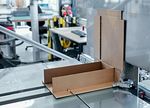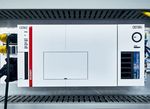Produce packaging on demand and made to mea- sure with more than 100 precisely controlled axes - Beckhoff
←
→
Page content transcription
If your browser does not render page correctly, please read the page content below
| packaging special | switzerland PC Control 01 | 2021
2 3
1
PC-based control enables product-specific, resource-saving packaging
Produce packaging on demand and made to mea-
sure with more than 100 precisely controlled axes
Online retail is booming and the packaging that is indispensable for this is becoming even more important. However, goods
are often shipped in unnecessarily large packaging. This increases costs, resource consumption and the environmental
impact. To avoid this, Swiss company Kern AG has developed the PackOnTime 2box packaging system. Using this system,
shipping boxes can be made to measure and exactly when it is needed. The project was implemented with the high-perfor-
mance PC-based automation solution from Beckhoff.PC Control 01 | 2021 packaging special | switzerland
|
4 5
© Kern AG
The PackOnTime® system consists of various modules: Placing and measuring (1),
feeding the corrugated board (2), processing the corrugated board (3), packing the
articles (4) and closing the packaging (5).
Kern AG in Konolfingen, Switzerland is a family business founded more
than 70 years ago and originally rose to success with enveloping machines.
“However, the market for enveloping machines, in particular at banks and
insurance companies, is progressively diminishing as conventional letters
are increasingly replaced by paperless communications,” explains Reto
Schori, Subproject Manager Electronics at Kern AG. This decline provided
the impetus to establish a new foothold in a related, promising market
with PackOnTime®: e-commerce. This sector still offers a great deal of po-
tential for growth and innovation, particularly with regard to sustainability.
Currently, conventional packaging often utilizes standard cardboard boxes,
which are considerably larger than the goods being shipped. As a conse-
quence, they are partially filled with filling material. Furthermore, excessive
volumes take up unnecessary space during transport to the customer along
© Beckhoff
with increased storage space. Simply put, oversized boxes and filling mate-
rial create an unnecessary amount of waste.
The system is controlled by a CX2062 Embedded PC.| packaging special | switzerland PC Control 01 | 2021
After switching to Beckhoff automation technology, the
control software was initially created with Structured Text.
“However, this type of programming required additional
documentation overhead,” says Reto Schori. “That is why
we decided to switch to TwinCAT 3 UML. The TwinCAT
Editor for the Unified Modelling Language (UML) offers
the advantage that the software is comprehensibly docu-
mented simultaneously with the development.”
Optimal design and synchronization of drive axes
Drive technology plays a major role in PackOnTime®.
Currently, around 100 drive axes are utilized in the plant
prototype and a further 30 are planned. “It is very im-
portant that Beckhoff offers an extremely wide range of
drive technology. With previous suppliers, we usually had
to decide on one type of motor and one type of motion
© Beckhoff
controller and then implement almost all of the applica-
tions with these. This sometimes proved extremely difficult
with regard to the parameterization,” explains Reto Schori.
The corrugated cardboard is cut to size, perforated and grooved to perfectly match the contents; “In contrast, this is far easier with Beckhoff. Because
the packaging can then be assembled, glued and transported to the insertion station. they offer an extensive product catalogue, enabling us to
select the optimum motor for every application as well as
the ideal drive technology with the AX8000 Servo Drive
and the EL72xx servomotor terminals. One Cable Technol-
The newly developed PackOnTime® system enables automated and on ogy (OCT) is another benefit because it significantly reduces the amount of
demand packaging of ordered products in shipping boxes produced to the cabling required.”
perfect size. This saves resources such as packaging material, space and time.
“We measure the length, width and height of the object or group of objects Along with the decision to go with PC-based control, EtherCAT was also
and then create a package with precisely the right size in the space of only selected for the fieldbus and is utilized consistently with PackOnTime®.
30 to 40 seconds,” says Reto Schori, explaining the concept. “The only “EtherCAT has truly proven its value in our system. The ability to synchronize
materials we use are sustainable corrugated cardboard and glue.” The system the axes with each other extremely easily via EtherCAT was a new experience
is capable of producing and filling up to 750 customized packages per hour. for us. This was not possible with the previous control system and CANopen
The system can be operated efficiently by just one person. bus technology,” says Reto Schori. “The fact that a great number of suppliers
now support EtherCAT was another advantage during the project implemen-
PC-based control succeeds in evaluation tation.”
“We spent a long time developing and utilizing our own control systems.
However, in 2016, we realized that we could no longer maintain the workload Kern AG is also impressed by the performance of EtherCAT, which in addition
necessary to do so. In addition, with our own controllers we did not achieve will increase significantly with the new EtherCAT G technology upgrade.
the speeds desired the way we do today with the Beckhoff solution,” reports “Currently, the performance when implementing PackOnTime® is thoroughly
Marcel Stalder, Head of Development at Kern AG. “When evaluating a suitable adequate. However, EtherCAT G, which is based on 1 or 10-Gbit Ethernet, may
control system, we approached several control system manufacturers, two of become an important factor in the future, as our modular system will be
which were able to implement their solutions for a specific project. Based on expanded to include additional modules,” adds Patrick Vogel, PackOnTime®
our positive experience during evaluation, we decided on Beckhoff as our Project Manager at Kern AG.
control systems supplier. Since then, all new projects have been implemented
with PC-based control from Beckhoff. This also applies to PackOnTime®.” Service tool increases reliability
Kern AG recommends that service organizations use the Beckhoff Service Tool
One of the reasons for using PC-based control is its open design allowing (BST) to maintain their systems and machines. “We believe it is essential to
different standards. “We initially had the idea of reusing software elements be able to replace a component in the field at any time, even an IPC. That is
developed for our own controls systems. However, that ultimately turned out why a tool like this is simply indispensable from our point of view,” continues
to be unnecessary,” adds Reto Schori. Kern chose a high-performance CX2062 Reto Schori, explaining this recommendation. BST is a user-friendly, graphical
Embedded PC with Intel® Xeon® CPU (2.0 GHz, 8 cores) for the PackOnTime® backup and restore program for Industrial PCs with a Windows operating
control system. CP3224 Economy Panel PCs with 24-inch multi-finger touch- system. In the event of failure, the operating system image can be restored or
screens serve as operator interface terminals. used to create a new IPC system with identical configurations and settings.PC Control 01 | 2021 packaging special | switzerland
|
© Beckhoff
The PackOnTime® system merges the articles fully
More information:
automatically with the tailor-made packaging.
www.kernworld.com
www.beckhoff.com/packaging
© Beckhoff
© Beckhoff
Marcel Stalder, Head of Development, Reto Schori, Subproject Manager Electronics, and Patrick More than 100 drive axes implemented with AM8000 servomotors enable
Vogel, Project Manager PackOnTime®, all from Kern AG, and Andreas Iseli, Head of the Beckhoff the numerous movements necessary to produce the packaging, transport the
Lyssach office, in front of the prototype of the Pack-on-Time system (from left to right) goods and insert the articles into the packaging.You can also read
























































